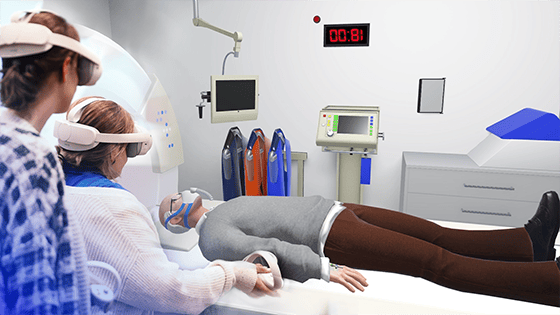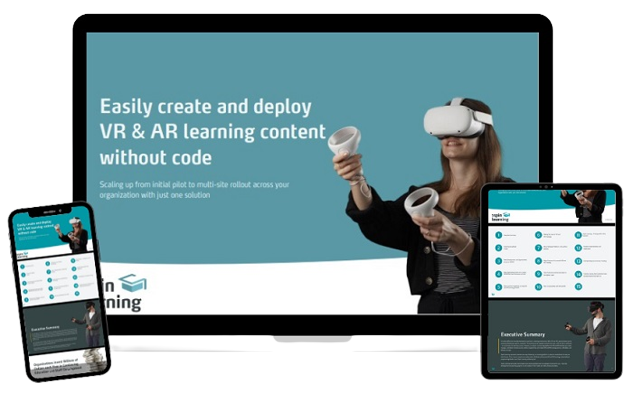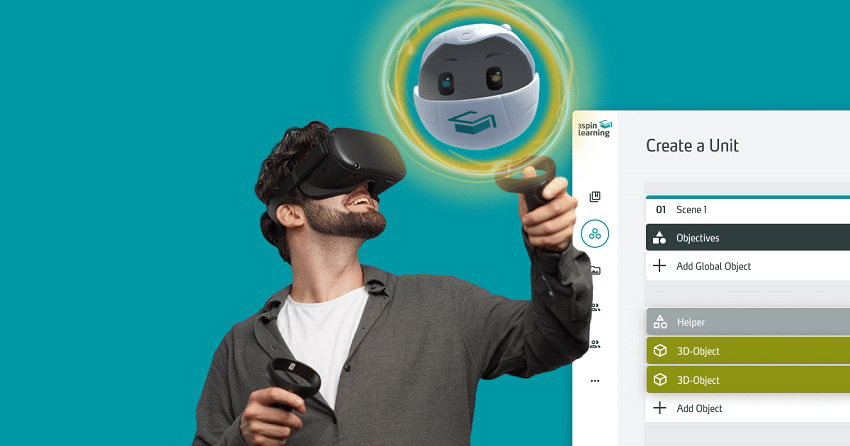Discover 3spin Learning’s Latest Product Features & Highlights
Discover how 3spin Learning's innovative VR features empower organizations to create immersive training courses without coding.
Im Interview mit dem Geschäftsführer von LearnChamp, Michael Repnik, erfahren Sie, was die Künstliche Intelligenz für das Lernen im Corporate Learning bedeuten.
Digital learning is playing an increasingly important role. Rrenowned eLearning agency LearnChamp is a pioneer in this field, developing customized training solutions for medium-sized to very large companies. The eLearning agency has licensed our 3spin Learning Platform to develop innovative Extended Reality (XR) training courses.
In an exclusive interview with Michael Repnik, Managing Director of LearnChamp, we learn more about the developments in XR technologies and how they are shaping the future of learning. These ground-breaking technologies promise an immersive learning experience that allows learners to experience real-life scenarios and learn complex concepts in a hands-on and interactive way.
Discover in this article:
MR: As a classic eLearning agency, LearnChamp focuses on content and modern learning technologies, i.e. learning portals and learning management systems that need to be implemented and configured for medium-sized and very large corporate clients. In doing so, we enable our customers to create an interplay between learning and content so that learners can get into a real flow. We strive for an "Amazing Learning Experience" so that it not only fits from a customer and project perspective but above all for the learners.
In this context, we have founded our Digital Learning Academy. There, we act as a service provider for companies, and, on the other hand, we also provide practical training for the specialists on the customer side so that they can create their eLearning training courses.
MR: When it comes to learning experiences in particular, numerous XR offerings are suitable for many learners to immerse themselves in real-life learning scenarios and experience a wide range of use cases up close. AR and VR training also makes sense from a didactic point of view because you can experience things for yourself, touch them yourself, and move them yourself - and not so much on a click level via a website, but in a very practical way.
Target groups often don't have the opportunity to read manuals. They need practical experience and to practice and simulate their fields of activity without the consequences of any mistakes. I'm thinking of logistics centers, the medical field, the fire service, and many others.

MR: The demand has been there for a long time, but it takes a surprisingly long time for corporate customers to get involved on a broad scale. Many often switch to 360-degree photos or videos at the beginning and enquire about VR glasses.
In the meantime, companies are becoming more open and I see a clear trend: in the future, there will be no way around XR in the learning and development sector. I like to compare the technology with mobile as another platform. Back then, it was said that everything would be switched to mobile, but in the beginning, companies' training departments stuck to desktop or laptop training. Mobile learning has now become widespread and I believe that this will also be the case with XR. And you can already see that from the current demand.
MR: Everything that is already here and will be here in the future fits well into a broader mix of methods. The ever-evolving technology is already making it easier and easier to use VR and AR, so perhaps one day most learning courses will take place in XR content. Convincing use cases speak for themselves. However, the next topic, namely artificial intelligence, is currently overtaking us. Here we will have to cooperate across technologies, just as you at 3spin Learning are already doing with your inbuilt text-to-speech feature.
In this sense, it is not one technology that will prevail, but many different ones that will combine fluently. At LearnChamp, we always have our finger on the pulse of L&D developments and conduct market research to offer a truly unique learning experience, because at the end of the day, the customer decides which product suits them best.
MR: I have seen how companies were sometimes overwhelmed by the topic of XR, were unable to scale or the cost side did not fit. 3spin Learning is one of the few companies that provides users with a platform with which they can create and conduct their own VR and AR training courses without massive programming effort and complex processes. Thanks to 3spin Learning, companies can make excellent use of the end product - with easy access.
Thanks to 3spin Learning, creating your own VR & AR training courses was incredibly easy. This is what makes 3spin Learning so important and attractive for our corporate customers.
Many authors and trainers don't know all the details at the beginning and often only realize later in the so-called lighthouse tests which areas are important and what can go wrong. 3spin Learning takes a lot of this work off our hands and has been able to convince us and our customers. We often receive active feedback that 3spin Learning's platform has simplified their work many times over. The ongoing updates and enhancements ensure constant improvements and state-of-the-art technology, which we are delighted with.

MR: Of course, we deliver a very high level of quality. If our customers were to build up this expertise in-house, it would take them years - at a high cost. We've all been there: employees leave the company, experts change departments or the internal IT team is far too small to take on the extra work.
What's more, many solo efforts go beyond the customer's resource ceiling and do not fulfill high-quality requirements. If both partners act as equals in the form of hybrid projects in which customers outsource certain areas, both companies can concentrate on the essentials. In this sense, the use of such a tool means real added value for everyone involved.
We do not replace ourselves and do not lose any orders but enable our customers to create and implement their own VR and AR training content independently. With our expertise as an eLearning agency, we help and support them in making this learning content even more professional, faster, and more efficient.
MR: The technology industry usually proclaims a revolution, but in the case of artificial intelligence, the developments will indeed bring about far-reaching changes - especially in the area of corporate learning. It almost seems as if the whole thing is moving even faster than with past technologies.
In this respect, no stone will be left unturned in the future. This applies to all areas, from skills management, content curation, and personalized learning to the creation of learning content, perhaps also the AI-supported creation of XR environments, and much more.
MR: Good question. I would say it depends on the customer, the person in question, and their interest in XR and artificial intelligence. There is still some catching up to do on the customer side. It is important to work out the use cases and decide where to start and where there is a knowledge advantage to be gained.
Most customers have realized that AI will have a major impact on corporate learning. If companies close their eyes to this development, it could well lead to challenges because developments are progressing so rapidly.
MR: We receive many questions, especially from corporate customers or, of course, in the public sector, that have to do with legal aspects. The questions are less about what is technically feasible, features, use cases, and support options, and more about finding the right public cloud solution that puts them on the safe side legally. It's about company-specific content, data protection, and the like.
These uncertainties need to be resolved and the market needs clear offers. Let's imagine a practical example: A company wants to use ChatGPT to create a storyboard or generate images. The question then arises as to who owns the content. As long as there are uncertainties in this environment, a certain amount of skepticism in purchasing or legal departments is justified and creates bottlenecks. Companies should check their services here and see where the data is stored and processed and what this means for the company in question.
It is important to allay fears and carefully address the concerns and worries of customers.
MR: We want to bring XR topics to a broad market and realize successful projects together with companies. Many inquiries come from sectors such as renewable energies/sustainability, medicine (technology), and, in general, various hazardous environments, from industry to logistics.
Thank you very much Michael for the interesting conversation!

Michael Repnik has been working in the learning and development industry for over twenty years. As a managing partner at LearnChamp and founder of Realize-HR, he is very familiar with work tech, and HR tech. He has many years of project experience from working with international companies in the fields of enterprise learning, talent management, and collaboration.

Discover how 3spin Learning's innovative VR features empower organizations to create immersive training courses without coding.
3spin Learning & TÜV NORD receive the Immersive Learning Award 2025 for their AI-based soft skills training with XR integration at LEARNTEC.
Discover the benefits of VR/AR & KI training and Learning 3.0 and the future of immersive learning in an interview with learning expert Torsten Fell.
Stay up to date on new insights in VR / AR learning with AI and build or improve your knowledge within the technology.